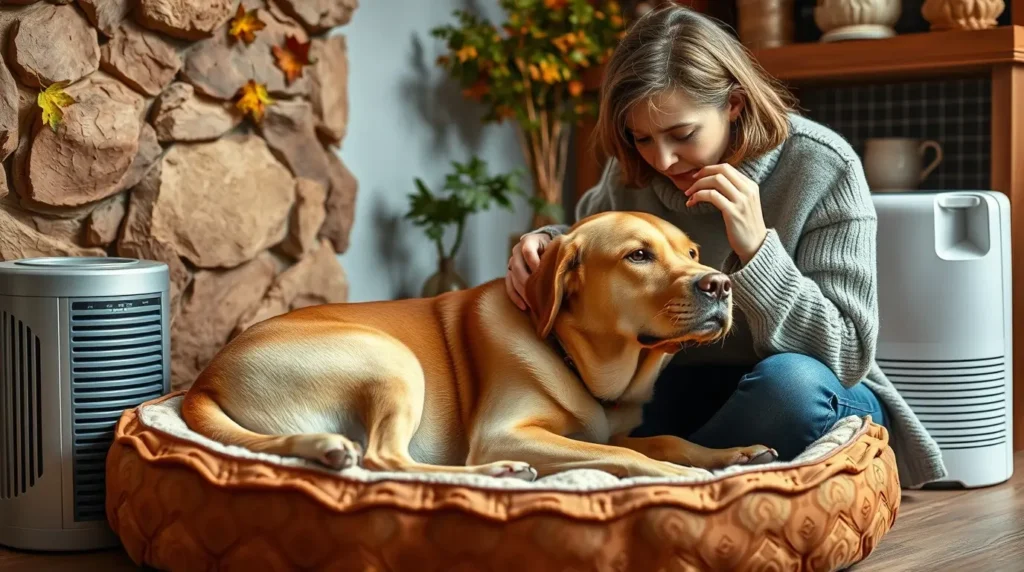Dogs can experience breathing difficulties due to various health conditions, including allergies, infections, or underlying respiratory issues. As a pet owner, it’s crucial to recognize the symptoms early and provide immediate care.
At Whizpet, we understand how much pet owners care about their furry friends, which is why we conducted in-depth research on dog breathing remedies to bring you the most effective natural solutions. Our experts analyzed veterinary studies, consulted pet health professionals, and reviewed real-life experiences from dog owners to compile this guide.
If your dog is struggling to breathe, finding the right dog breathing remedies can make a significant difference in their well-being. Our research highlights easy-to-follow, at-home solutions that provide relief without needing expensive treatments. By implementing these dog breathing remedies, you can ensure your pet enjoys a healthier, more comfortable life.
In this guide, we’ll explore home remedies for dog difficulty breathing, ensuring your furry friend gets the relief they need.
Understanding Dog Breathing Problems
Before diving into remedies, let’s look at common causes of breathing difficulties in dogs:
- Allergies – Dust, pollen, and mold can trigger respiratory distress. Dogs suffering from allergies may exhibit sneezing, watery eyes, and excessive licking or scratching. Airborne allergens can irritate their airways, making it difficult for them to breathe. Implementing dog breathing remedies such as air purifiers and hypoallergenic bedding can help reduce exposure.
- Respiratory Infections – Bacterial or viral infections affecting the lungs can lead to symptoms like coughing, nasal discharge, and wheezing. A weakened immune system makes dogs more susceptible to these infections. Providing dog breathing remedies such as steam therapy and herbal treatments can alleviate discomfort.
- Heart Disease – This condition can lead to fluid buildup in the lungs, causing labored breathing, lethargy, and persistent coughing. Regular vet checkups and a heart-healthy diet can help manage symptoms and improve overall well-being.
- Nasal Blockages – Foreign objects, excessive mucus, or polyps can obstruct airflow, making it challenging for dogs to breathe through their nose. This can cause snorting, frequent sneezing, or even difficulty eating. Saline nasal flushes are effective dog breathing remedies to clear blockages and improve airflow.
- Obesity – Excess weight puts added pressure on the lungs and airways, making breathing harder for overweight dogs. Ensuring a proper diet and regular exercise can significantly improve respiratory function.
- Old Age – Senior dogs often develop weaker respiratory function due to decreased lung capacity and muscle tone. Monitoring their breathing and providing supportive care, such as keeping them in a comfortable, ventilated space, can enhance their quality of life.

Signs Your Dog is Struggling to Breathe
Recognizing symptoms early can help prevent emergencies:
- Wheezing or gasping for air
- Excessive panting even when not active
- Coughing or gagging
- Flared nostrils while breathing
- Bluish gums (a sign of oxygen deprivation)
- Lethargy and reluctance to move
If your dog exhibits severe distress, seek immediate veterinary attention.
In addition to these symptoms, you may notice your dog adopting unusual postures, such as extending their neck or standing with their elbows spread apart to try to breathe better. These are clear indicators of respiratory distress. Dog breathing remedies like providing a humidified environment or using a fan to improve air circulation can offer temporary relief while you seek medical help.
Another common sign of breathing problems is an increased respiratory rate, even while your dog is at rest. Normally, dogs take about 15-30 breaths per minute when relaxed. If you count more than 40 breaths per minute while they are calm, it may indicate an issue requiring intervention. Dog breathing remedies such as keeping them in a cool, quiet area can help manage mild breathing issues.
Pay close attention to any unusual noises when your dog breathes, such as high-pitched whistling or loud snoring-like sounds. These could be signs of airway obstruction or tracheal collapse, especially in brachycephalic (short-nosed) breeds like Bulldogs or Pugs. Implementing dog breathing remedies like gentle chest massages or controlled exercise routines can support better respiratory health.
Remember, breathing difficulties can quickly escalate into life-threatening situations. If your dog’s gums turn a deep blue or gray color, this means they are not getting enough oxygen. Immediate veterinary attention is necessary in such cases. Early detection and proper dog breathing remedies can significantly improve your pet’s quality of life and overall well-being.
Home Remedies for Dog Difficulty Breathing
1. Use a Steam Therapy Session
Steam can help loosen mucus and open up nasal passages.
- Run a hot shower and allow your dog to inhale the steam in the bathroom for 10-15 minutes.
- Alternatively, use a humidifier to keep the air moist, especially at night.
2. Elevate Your Dog’s Head While Sleeping
If your dog struggles with breathing while sleeping, try elevating their head with a soft pillow or rolled-up towel to reduce airway obstruction.
3. Honey and Warm Water Mixture
Honey has natural antibacterial properties and can soothe irritated airways.
- Mix 1 teaspoon of raw honey with warm water and offer it 2-3 times a day.
4. Herbal Remedies to Soothe Airways
- Licorice root – Known for anti-inflammatory benefits.
- Eucalyptus oil (diffused in the air, NOT applied directly) – Helps clear congestion.
- Peppermint tea (cooled) – Aids in nasal decongestion.
5. Ensure Proper Hydration
Keeping your dog hydrated helps thin mucus and prevents airway blockage.
- Offer fresh water throughout the day.
- Add low-sodium chicken broth to encourage drinking.
6. Create an Allergen-Free Environment
If allergies trigger your dog’s breathing problems:
- Wash bedding frequently.
- Use air purifiers to remove airborne irritants.
- Avoid smoking or using strong scents around your pet.
7. Try a DIY Nasal Flush for Congestion
If your dog is having trouble breathing through the nose, gently flush their nostrils with a saline solution using a pet-safe nasal spray.
8. Monitor Diet and Weight
Obesity worsens breathing problems. Ensure your dog:
- Eats a balanced, vet-approved diet.
- Gets regular exercise tailored to their condition.
9. First Aid Positioning for Immediate Relief
If your dog experiences sudden difficulty breathing:
- Keep them calm and in a standing or sternal position (lying on their stomach with legs extended).
- Avoid putting pressure on their chest.
Frequently Asked Questions (FAQs)
- What home remedies can help my dog breathe more easily?
You can try steam therapy, honey and warm water, humidifiers, and herbal solutions like licorice root or eucalyptus diffusers to help your dog breathe better. These dog breathing remedies can naturally support your pet’s respiratory health and improve airflow.
- What are the best ways to help my dog breathe easier at home?
Ensure they have an allergen-free environment, elevate their head while sleeping, keep them hydrated, and manage their weight. Implementing dog breathing remedies like using a humidifier or offering herbal teas can provide additional relief.
- What are the best home remedies for a dog struggling to breathe through its nose?
A saline nasal flush, steam therapy, and humidifiers can help clear nasal congestion effectively. These dog breathing remedies can assist in loosening mucus and improving nasal airflow.
- Can old age cause breathing problems in dogs?
Yes, senior dogs often develop weaker respiratory function. Providing joint support, weight management, and regular vet checkups can help alleviate breathing issues. Dog breathing remedies such as controlled exercise and a well-balanced diet can also support senior dogs’ lung function.
- What position helps a dog breathe better?
The best position is the sternal position, where your dog lies on their stomach with legs extended.Avoid positioning them on their back, as it may exacerbate breathing difficulties. Using dog breathing remedies such as ensuring good air circulation can further aid in their comfort.
Conclusion: Natural Solutions for Dog Breathing Remedies
Using home remedies for dog difficulty breathing can help your pet find relief from congestion, allergies, and respiratory distress. Always monitor their symptoms and consult a vet if their condition worsens. Implement these dog breathing remedies today to support your dog’s respiratory health!
Is your dog experiencing breathing issues? Try these dog breathing remedies and share your experience in the comments!
Related blog: For more detailed information about pet care


Pingback: How to Make Homemade Dog Food for Renal Disease: Best Recipes & Tips